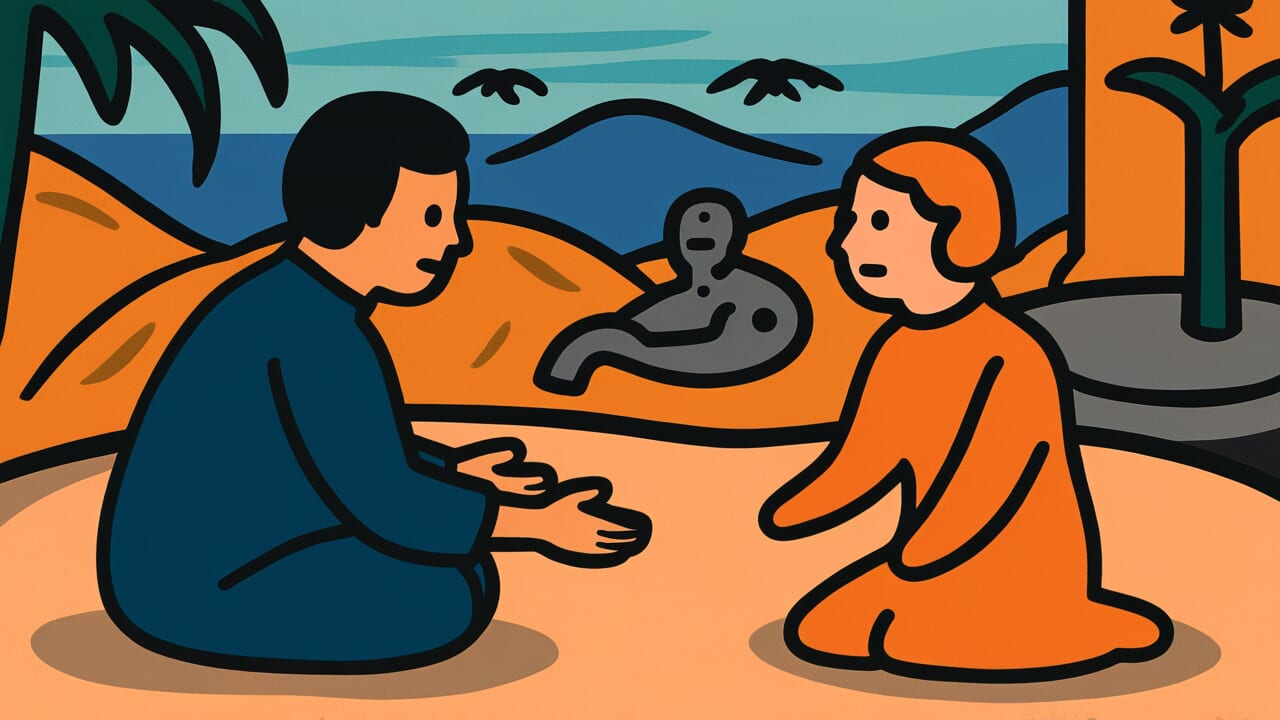How to Read “With it, hell; without it, paradise”
Atte jigoku, nakute gokuraku
Meaning of “With it, hell; without it, paradise”
This proverb means that having something causes suffering, while not having it brings peace and happiness.
Things that seem valuable and desirable can actually create problems when you own them. They require management, cause worry, and become sources of suffering.
On the other hand, not having these things frees you from such troubles. You can live with a calm heart. This expresses life’s irony.
People use this saying when talking about the burden of possessions, status, or talent. It also applies when explaining the relief of letting things go.
Today, it points out how excessive ownership and responsibility can make people suffer. It reminds us to appreciate the value of simple living.
Origin and Etymology
The exact first appearance of this proverb in literature is unknown. However, its structure offers interesting insights.
The saying contrasts the Buddhist terms “hell” and “paradise.” This suggests it emerged when Buddhist thought deeply influenced common people’s lives.
Notice that it doesn’t just say “good” or “bad.” It uses the extreme contrast of “hell” and “paradise.”
This shows how our ancestors tried to express the enormous impact something can have on life. They chose the most powerful words possible.
The paired structure of “with it” and “without it” is a traditional Japanese rhetorical technique. This creates rhythm and makes the saying memorable.
Many proverbs passed down orally among common people share this easy-to-remember format. This is no coincidence.
What “it” refers to changes with context. Money, status, talent, beauty – things that seem desirable can actually torment their owners.
This proverb expresses life’s paradox using Buddhist worldview. It contains deep insight that connects with Buddhist teachings about attachment and worldly desires.
Usage Examples
- When I see my relative caught up in family disputes after inheriting a fortune, I think it’s truly “With it, hell; without it, paradise”
- I became a manager and gained more responsibility, but I realize “With it, hell; without it, paradise” – I was more carefree as a regular employee
Universal Wisdom
This proverb reveals the complex relationship between human desire and happiness.
We instinctively think “having more” equals happiness. But our ancestors sharply understood the paradox – owning things creates new suffering.
When you have wealth, you fear theft and loss. When you gain status, responsibility and pressure crush you.
When you have talent, you must meet others’ expectations. Owning something creates fear of losing it and attachment to protecting it.
This psychological mechanism doesn’t change with time. It remains constant as long as we’re human.
Interestingly, this proverb isn’t simply recommending poverty. Rather, it warns against the assumption that “having things brings happiness.”
It shows deep understanding that happiness cannot be measured by quantity of possessions.
In today’s consumer society, this wisdom becomes even more important. We’re constantly pushed to want “more.”
But true peace may not depend on how much we own. It may depend on our state of mind.
This saying from our ancestors continues to convey a universal truth. Material wealth and spiritual wealth don’t necessarily align.
When AI Hears This
The human brain is designed to feel the pain of losing something 2.5 times more strongly than the joy of gaining it.
This is called loss aversion bias. When you don’t have wealth or status, you have nothing to lose, so your mind stays calm.
But once you have it, the fear of “I might lose this” constantly haunts you from that moment on.
Even more interesting is the phenomenon called reference point dependence. Humans don’t measure happiness by absolute wealth.
They measure it based on where they are now. Someone earning $30,000 who gets $50,000 feels happy.
But someone who earned $100,000 and drops to $50,000 feels miserable. Same $50,000, but the brain compares to the past self.
Experimental data shows that lottery winners’ happiness returns to pre-winning levels after about one year.
Moreover, owning creates maintenance costs, changes in relationships, and tax worries that become new stress sources. Problems that wouldn’t exist without ownership keep appearing.
This proverb understood this mathematical asymmetry in the human brain hundreds of years before science proved it.
When you measure life not by total happiness but by total psychological burden, having nothing is indeed easier mathematically.
Lessons for Today
This proverb teaches you to develop eyes that can discern what true richness really means.
Everyone feels envious seeing others’ glamorous lives on social media. Everyone feels rushed to acquire more.
But if you can notice the invisible burdens and struggles behind the scenes, you can view your current situation from a different angle.
What matters is thinking calmly before acquiring something. Will it truly enrich your life, or become a new burden?
Career advancement, expensive purchases, expanding relationships – even seemingly attractive things need questioning. Are they worth sacrificing your peace of mind?
Sometimes you need courage to let go. Sometimes you need courage to choose not to have.
True happiness might actually be hiding in the simple daily life you already have.
This proverb gently teaches the importance of knowing when you have enough.



Comments